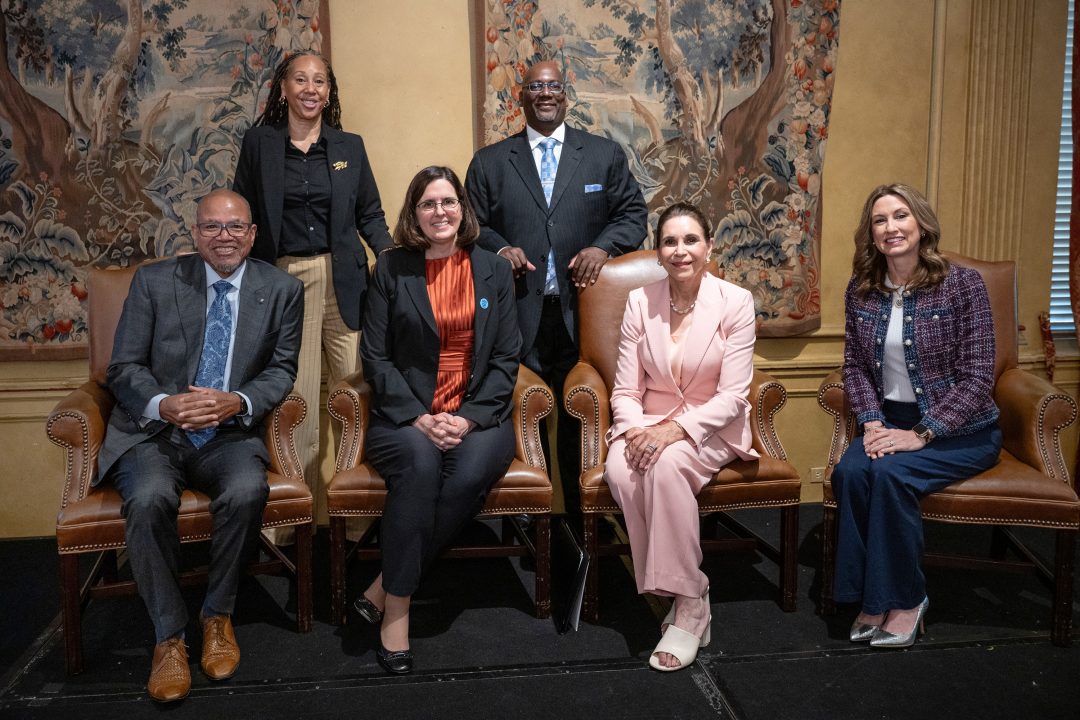FORT WORTH, Texas — Tarrant County higher education leaders say spirited partnerships, informed by overlapping yet keenly individual strategic plans, are vital to keeping North Texas competitive, prosperous and prepared. At a State of Higher Education Forum this week hosted by the Business Press, they underscored the role of a collaborative, community-driven vision in strengthening the region’s talent pipeline.
From rising enrollment and expanded facilities to innovative programs shaped by industry input, Tarrant County College Chancellor Elva LeBlanc and campus presidents Kirk Calhoun (UNT Health Fort Worth), Jennifer Cowley (UT Arlington) and Emily Messer (Texas Wesleyan University) all said multiyear plans produce results — crafting the workforce of today while anticipating tomorrow’s needs.
“Strategic planning enables us to align with market-driven demands and anticipate what’s next,” Dr. LeBlanc said. “It ensures that every student who walks through our doors has the opportunity to succeed, and that our region has the talent to thrive.” TCC says its strategic plan, Trailblazing Together: 2030, particularly provides the framework to enhance the student experience, elevate academic excellence and boost economic impact.
The panel made clear: Partnerships across industries, communities and all North Texas education institutions, including independent school districts, are not optional. They are essential to prepare the next generation of graduates to fuel the region’s continued growth. And that readiness begins with local high school students.
UTA’s Dr. Cowley: “One of the challenges for our region is educational attainment. Regardless of what institution someone chooses, we need students graduating from area high schools to go on and earn post-secondary credentials.”
Dual enrollment is a cornerstone of that effort. “Dual credit and Early College High Schools give students a head start on college while still in high school,” Dr. LeBlanc noted. “They accelerate learning and build the skills and confidence needed to succeed.”
Tarrant County College works with ISDs countywide to create higher education pathways, including 100 dual credit campuses, 15 Early College High Schools and 17 Pathways in Technology sites. Approximately 12,500 current TCC Trailblazers are dual enrolled, with around 700 annually completing an associate degree and earning a high school diploma at the same time.
Beyond dual enrollment, TCC’s commitment to student success extends to advanced degree opportunities. By partnering with more than 70 four-year institutions — among them UT Arlington, UNT and Texas Wesleyan — TCC opens doors for students to earn bachelor’s and graduate degrees without losing momentum. Example: The bachelor’s in biomedical sciences at UNT Health Fort Worth, a 100% online program, offers TCC graduates a direct path to advanced studies or immediate entry into healthcare careers.
The panelists emphasized that evolving legislation, funding and affordability influence how quickly students reach their career goals. Navigating shifting state policies requires institutions to be nimble, innovative and entrepreneurial.
Dr. Calhoun said UNT Health’s success — training 1,000 doctors, conducting $120 million in research and serving 100,000 patients a year — demands flexibility, staying true to core values and quickly adapting to government changes.
“Community colleges are structured in such a way that we’re expected to pivot quickly,” Chancellor LeBlanc concurred. “We’re expected to be entrepreneurial and to figure things out.”
She highlighted her school’s move this year to zero-based budgeting to ensure that every expense aligns with Trailblazing Together: 2030 priorities and supports Texas House Bill 8; the budget process links measurable student performance outcomes to state funding. She also pointed to the TCC Board of Trustees holding the line on the College’s property tax rate, one of the lowest in the county — 56th of the 58 major public taxing entities.
Cost remains a top concern in any higher education pursuit. Through strategic planning, TCC, UT Arlington, UNT Health and Texas Wesleyan are implementing initiatives to keep tuition and fees manageable and financial assistance maximized. UT Arlington, for instance, offers free tuition for eligible undergraduates in families earning under $100,000, and TCC dual credit students attend at no cost.
While each of these institutions has its own mission, governance and funding model, the regional demand for talent is too great for them to go it alone. They emphasize that working together can prepare more students for success and strengthen the entire community.
Wesleyan’s Dr. Messer: “Partnership is one of the key performance indicators in our new strategic plan (launching in January). We want to have partnerships with our ISDs, with our community colleges, with other four-year institutions and with graduate programs.”
“All four of our institutions want to grow,” Dr. Calhoun added. “We want to fulfill our mission, and that’s the focus of our strategic plans.”
Dr. Cowley spoke of the need for each institution to graduate as many students as possible to meet talent demand. Referring to the panelists, she said, “These are my partners. We work well together in the areas where we excel the most.”
Looking ahead, the panelists acknowledged the transformative role of emerging technologies like artificial intelligence. They agreed that integrating AI responsibly into teaching, learning and administrative processes will be critical to keeping North Texas students competitive.
“Innovation today — including AI — will shape the opportunities we create for students tomorrow,” Dr. LeBlanc said. “Combining our collective strengths with new technologies will expand access, personalize learning and equip graduates with the skills employers need most.”
Everybody wins. Students. Those who teach them. Those who hire them. And all who benefit from what they bring to the table.
Which is why these area higher education leaders do what they do.
Another thing they could agree on.
Celebrating 60 years of excellence and impact in 2025, Tarrant County College is one of the nation’s largest higher education institutions and boasts the second lowest tuition of Texas’ Top 10 community colleges. A comprehensive community college with six campuses in Tarrant County, TCC offers a range of opportunities for learners of all ages and backgrounds.

